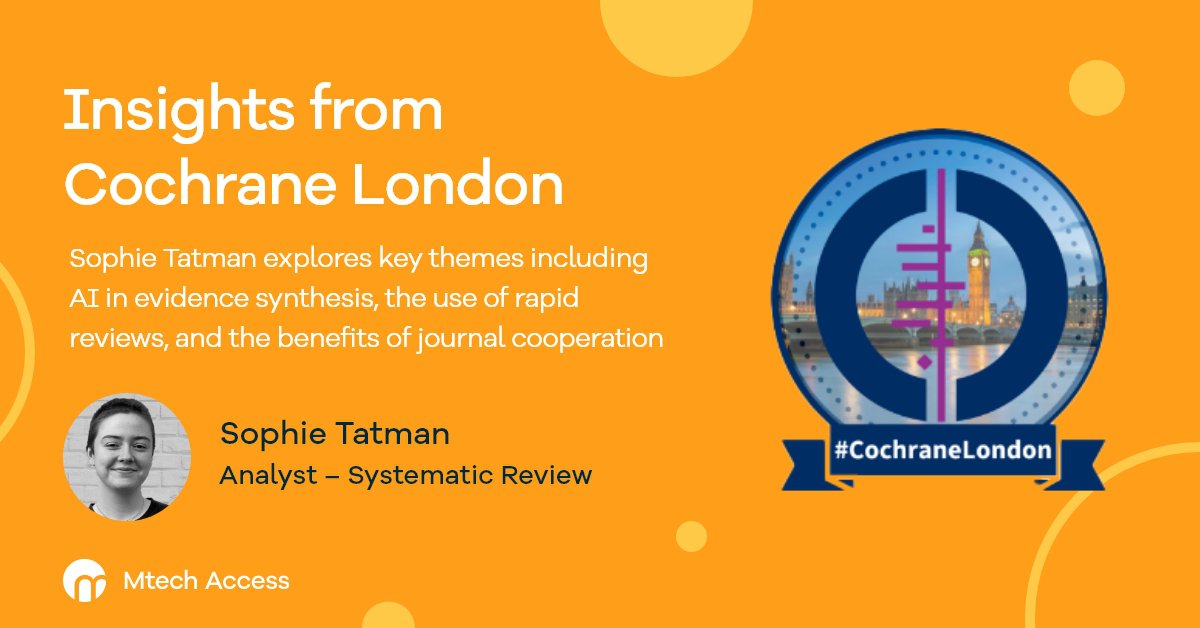
This September, Sophie Tatman and Stephanie Swift attended the Cochrane Colloquium in London. The event offers specialists in evidence-informed healthcare decision-making the opportunity to explore the latest research and consider important global health questions. Sophie and Stephanie were excited to bring back new methods and learnings to share with our team and clients.
Here, Sophie explores some key themes from the conference. Jump to:
- Artificial intelligence and machine learning in evidence synthesis
- Recommendations on rapid reviews
- Journal cooperation for research integrity
- Representation and accessibility
Artificial intelligence and machine learning in evidence synthesis
As artificial intelligence (AI) gains traction in all areas of modern life, it is not surprising that reviewers are exploring its capabilities. The use of large language models (LLMs), such as ChatGPT, show the potential that machine learning (ML) has for streamlining screening, data extraction, and risk of bias assessment.
The sessions at Cochrane showcase some of the latest thinking and innovations in AI as well as some of the challenges it brings. While much progress has been made, and ML will undoubtedly become a part of the systematic review process in the future, human systematic reviewers should be reassured that we won’t become obsolete any time soon. Adoption of these technologies in Evidence-Based Medicine (EBM) and Health Technology Assessment (HTA) bodies is currently limited
Unfortunately, there is also potential for misuse of AI. The involvement of AI in falsified research has caused an ‘arms race’ between the fraudulent use of AI and the use of AI to detect such fraudulent research.
The Mtech Access innovation team are currently exploring the use of AI across the healthcare sector. To learn more and contribute to their research, email info@mtechaccess.co.uk.
Recommendations on rapid reviews
The demand for systematic reviews continues to expand with shorter timelines reflecting commercial and clinical pressures. This was especially prevalent during the COVID pandemic, when evidence on a limited timescale was crucial. Coincidentally, Cochrane presented guidelines for the ‘rapid review’ in March 2020, just days before the pandemic began.
In an afternoon workshop session, the Cochrane Rapid Reviews Methods Group (RRMG) described increased speed of planning, conducting and sharing systematic reviews as a main characteristic of the rapid review. However, they specified that in order to qualify, methods considered non-essential should be simplified or omitted, and should be clearly described by the authors (meaning ML won’t be the answer here).
Almost all stages of a full gold-standard systematic literature review are condensed in a rapid review. The potential for bias or error here explains the prerequisite for authors to report all methodology comprehensively and transparently.
Journal cooperation for research integrity
An interesting morning session on research integrity found the speakers recommending cooperation between journals.
Greater cooperation could help draw attention to fraudulent research groups. It could also help avoid the successful resubmission of content previously rejected due to dubious data.
Collaborations between journals, but also between national and international research bodies, will help reduce duplication of research and help bring to light the publication of fraudulent data.
Representation and accessibility
Despite a somewhat underwhelming turnout for the equality, diversity, and inclusion session, it proved to be a really interesting discussion about these key issues within both Cochrane and scientific publishing in general.
Representation issues include gender, racial, and language biases, as well as accessibility issues, including lack of support for disabled individuals or access to librarians in academic settings. These are still prevalent and require active challenging for any progress to be made.
The key takeaway from this session was the under-representation of these groups in leadership, such as on editorial boards. Until these groups have leaders that represent them, disparities are bound to continue.
Final thoughts
Overall, the Cochrane Colloquium 2023 was a great meeting that brought the systematic review community together in-person for the first time since the COVID pandemic, and celebrated 30 years of the Cochrane institution. We are excited to see what innovations and methodological updates the next 30 years brings!
To discuss the latest research methodologies with our evidence synthesis experts, email info@mtechaccess.co.uk


